According to an international study published in 2016 by Zeno Group, today’s youth are more socially and globally minded than previous generations and share an enthusiastic desire to find new solutions to the world's most pressing problems. In this week’s column, we review a few of the many recently published books that introduce critical issues, spark important conversations, invite further exploration, and support the activism of children and young adults who want to contribute to positive change.
Ages 4–8
The Brilliant Deep: Rebuilding the World’s Coral Reefs: The Story of Ken Nedimyer and the Coral Restoration Foundation. Kate Messner. Ill. Matthew Forsythe. 2018. Chronicle.
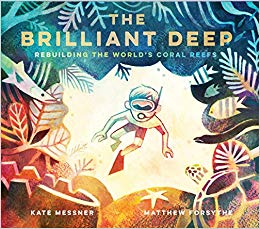 “It starts with one.” Kate Messner uses these four words to begin and end this informational picture book about the work of Ken Nedimyer, coral renewal pioneer and founder of the Coral Restoration Foundation. Though seemingly simple, these four words signify the power of one in generating change, a theme that is echoed throughout the book. Just as a single coral can grow into an entire reef, Ken Nedimyer is a single activist who inspires others to join his efforts to conserve the ocean’s ecosystems through coral reef transplants. The back matter lists additional information on coral reefs, including ideas for activism, print and online resources, and vocabulary terms.
“It starts with one.” Kate Messner uses these four words to begin and end this informational picture book about the work of Ken Nedimyer, coral renewal pioneer and founder of the Coral Restoration Foundation. Though seemingly simple, these four words signify the power of one in generating change, a theme that is echoed throughout the book. Just as a single coral can grow into an entire reef, Ken Nedimyer is a single activist who inspires others to join his efforts to conserve the ocean’s ecosystems through coral reef transplants. The back matter lists additional information on coral reefs, including ideas for activism, print and online resources, and vocabulary terms.
—SH
The Day You Begin. Jacqueline Woodson. Ill. Rafael López. 2018. Nancy Paulsen/Penguin.
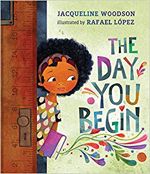 “There will be times when you walk into a room and no one there is quite like you.” Children often feel very different and alone in school, whether it is because of their hair, skin, language, clothes, the food they eat, the vacations not taken, or physical limitations. Woodson gently shifts the story to show how the children in a class learn that they are more alike than different when they begin to share their stories. López’s bright mixed-media illustrations perfectly tell the story along with the text, especially in the eyes of the children. The final double-page spread depicting African-American Angelina and Rigoberto from Venezuela happily swinging together says it all. “This is the day you begin to find the places . . . where every new friend has something a little like you—and something else so fabulously not quite like you at all.”A Spanish edition, El día en que descubres quíén eres, is also available.
“There will be times when you walk into a room and no one there is quite like you.” Children often feel very different and alone in school, whether it is because of their hair, skin, language, clothes, the food they eat, the vacations not taken, or physical limitations. Woodson gently shifts the story to show how the children in a class learn that they are more alike than different when they begin to share their stories. López’s bright mixed-media illustrations perfectly tell the story along with the text, especially in the eyes of the children. The final double-page spread depicting African-American Angelina and Rigoberto from Venezuela happily swinging together says it all. “This is the day you begin to find the places . . . where every new friend has something a little like you—and something else so fabulously not quite like you at all.”A Spanish edition, El día en que descubres quíén eres, is also available.
—SK
I Walk with Vanessa: A Story About a Simple Act of Kindness. Kerascoët. 2018. Schwartz & Wade/Random House.
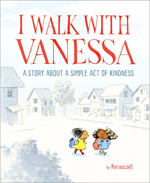 Bullying is simply and effectively addressed in this wordless picture book by Kerascoët, a French husband and wife team of illustrators. A little girl enters a new school and is verbally accosted by a bully while walking home. A classmate watches as the girl runs into her house in tears. In a simple act of kindness, she knocks on the new girl’s door the next morning and walks with her to school. Other children join them and, as the two girls become surrounded by others, the bully stands alone. The book ends with an informational page on how children can help someone who is being bullied and how adults can talk about this book with children.
Bullying is simply and effectively addressed in this wordless picture book by Kerascoët, a French husband and wife team of illustrators. A little girl enters a new school and is verbally accosted by a bully while walking home. A classmate watches as the girl runs into her house in tears. In a simple act of kindness, she knocks on the new girl’s door the next morning and walks with her to school. Other children join them and, as the two girls become surrounded by others, the bully stands alone. The book ends with an informational page on how children can help someone who is being bullied and how adults can talk about this book with children.
—SK
Pie Is for Sharing. Stephanie Parsley Ledyard. Ill. Jason Chin. 2018. Neal Porter/Roaring Brook.
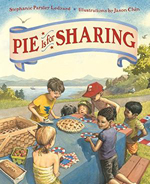 Stephanie Parsley Ledyard’s spare, poetic text and Jason Chen’s lively watercolor and gouache illustrations depict a Fourth of July picnic, where a diverse group of children and their families are happily sharing books, trees, games, and, of course, pie. “Words and music are made for sharing. So are berries and the last piece of homemade bread. Even the crumbs.” Reading aloud Pie Is for Sharing to young children presents a gentle lesson about equitable sharing (even when it seems like there may not be enough to go around) and a platform for discussing inclusion.
Stephanie Parsley Ledyard’s spare, poetic text and Jason Chen’s lively watercolor and gouache illustrations depict a Fourth of July picnic, where a diverse group of children and their families are happily sharing books, trees, games, and, of course, pie. “Words and music are made for sharing. So are berries and the last piece of homemade bread. Even the crumbs.” Reading aloud Pie Is for Sharing to young children presents a gentle lesson about equitable sharing (even when it seems like there may not be enough to go around) and a platform for discussing inclusion.
—SH
What Can a Citizen Do? Dave Eggers. Ill. Shawn Harris. 2018. Chronicle.
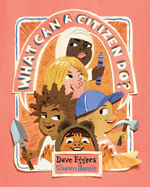 “What in the world can a citizen do?” Quite a lot, as Eggers and Harris demonstrate in this child-friendly introduction to the basics of citizenship. A simple rhyming text and colorful cut-paper illustrations show how a diverse group of children work together and make compromises to create an inclusive treehouse community on an island on which a single tree grows. This picture book clearly and joyfully informs young children that, as citizens, they can get involved and make a difference. “A citizen’s not what you are—a citizen is what you do.”
“What in the world can a citizen do?” Quite a lot, as Eggers and Harris demonstrate in this child-friendly introduction to the basics of citizenship. A simple rhyming text and colorful cut-paper illustrations show how a diverse group of children work together and make compromises to create an inclusive treehouse community on an island on which a single tree grows. This picture book clearly and joyfully informs young children that, as citizens, they can get involved and make a difference. “A citizen’s not what you are—a citizen is what you do.”
—CA
Ages 9–11
Camp Panda: Helping Cubs Return to the Wild. Catherine Thimmesh. 2018. Houghton Mifflin.
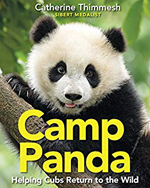 Catherine Thimmesh provides an informative and engaging overview of the giant panda’s comeback by highlighting the work of the China Conservation and Research Center for the Giant Panda and including numerous full-color photographs of the panda. While conservation efforts like Camp Panda have recently led to a change in the conservation status of the giant panda from endangered to vulnerable, Thimmesh also points out the negative impact humans have had on the species in the past and the necessity for continued activism and conservation. Back matter includes suggestions for how children can learn more about giant pandas and support conservation efforts as well as a glossary, bibliography, brief biographical notes on some of the panda conservation experts, and an index.
Catherine Thimmesh provides an informative and engaging overview of the giant panda’s comeback by highlighting the work of the China Conservation and Research Center for the Giant Panda and including numerous full-color photographs of the panda. While conservation efforts like Camp Panda have recently led to a change in the conservation status of the giant panda from endangered to vulnerable, Thimmesh also points out the negative impact humans have had on the species in the past and the necessity for continued activism and conservation. Back matter includes suggestions for how children can learn more about giant pandas and support conservation efforts as well as a glossary, bibliography, brief biographical notes on some of the panda conservation experts, and an index.
—SH
Harbor Me. Jacqueline Woodson. 2018. Nancy Paulsen/Penguin.
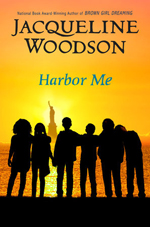 Haley recalls the events of the previous school year when Ms. Laverne, their teacher, took the six students in the special fifth- and sixth-grade classrooms to Room 501, the old art room that became the ARTT room—“A Room To Talk”—where they were to sit in a circle and talk about anything they wanted to without adult supervision each Friday. Over the year, within the community of respectful listeners they built, the six children from diverse backgrounds began to use their voices to express feelings and fears about personal problems (which readers will recognize as societal problems, including bullying, racial profiling, deportation of undocumented immigrants, and incarceration of a parent). Harbor Me is yet another moving and memorable novel from master storyteller Jacqueline Woodson.
Haley recalls the events of the previous school year when Ms. Laverne, their teacher, took the six students in the special fifth- and sixth-grade classrooms to Room 501, the old art room that became the ARTT room—“A Room To Talk”—where they were to sit in a circle and talk about anything they wanted to without adult supervision each Friday. Over the year, within the community of respectful listeners they built, the six children from diverse backgrounds began to use their voices to express feelings and fears about personal problems (which readers will recognize as societal problems, including bullying, racial profiling, deportation of undocumented immigrants, and incarceration of a parent). Harbor Me is yet another moving and memorable novel from master storyteller Jacqueline Woodson.
—CA
Red Alert!: Endangered Animals Around the World. Catherine Barr. Ill. Anne Wilson. 2018. Charlesbridge.
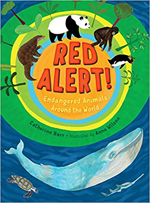 On the first page of this interactive picture book that features 15 endangered animals, the reader is asked to “pick a place” (a biome). This takes them to a page where they “choose a creature” (an endangered animal) and are directed to a colorful double-page spread that includes an introductory “story” and bulleted facts about the species as well as a boxed insert on the conservation status assigned to it by the International Union for Conservation of Nature (IUCN). Finally, the reader is directed to a page for follow-up information about how they can help the showcased endangered species. Back matter includes information on the IUCN Red List, including a list of an additional 60 “red” creatures not featured in the book, which may encourage research to learn about them too.
On the first page of this interactive picture book that features 15 endangered animals, the reader is asked to “pick a place” (a biome). This takes them to a page where they “choose a creature” (an endangered animal) and are directed to a colorful double-page spread that includes an introductory “story” and bulleted facts about the species as well as a boxed insert on the conservation status assigned to it by the International Union for Conservation of Nature (IUCN). Finally, the reader is directed to a page for follow-up information about how they can help the showcased endangered species. Back matter includes information on the IUCN Red List, including a list of an additional 60 “red” creatures not featured in the book, which may encourage research to learn about them too.
—SH
What’s the Big Deal About Elections. Ruby Shamir. Ill. Matt Faulkner. 2018. Philomel/Penguin.
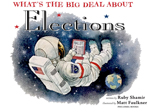 In this third book in their What’s the Big Deal About series, Ruby Shamir and Matt Faulkner inform readers about the way our country’s leaders are chosen and why the results of elections are important to everyone. The format of the book is engaging. The topic of each double-page spread is introduced with a question followed by a general paragraph that provides an answer and a lively, interest-catching watercolor and pencil illustration. Additional facts are provided in text boxes paired with spot art. Back matter includes a timeline and an author’s note.
In this third book in their What’s the Big Deal About series, Ruby Shamir and Matt Faulkner inform readers about the way our country’s leaders are chosen and why the results of elections are important to everyone. The format of the book is engaging. The topic of each double-page spread is introduced with a question followed by a general paragraph that provides an answer and a lively, interest-catching watercolor and pencil illustration. Additional facts are provided in text boxes paired with spot art. Back matter includes a timeline and an author’s note.
—CA
Ages 12–14
Back from the Brink: Saving Animals from Extinction. Nancy F. Castaldo. 2018. Houghton Mifflin Harcourt.
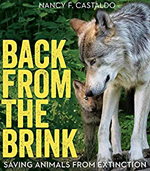 This engaging nonfiction book informs readers about animals that almost became extinct but were saved due to the caring, diligent, and sometimes controversial efforts of organizations, groups, and ordinary citizens. Nancy Castaldo writes about whooping cranes, wolves, bald eagles, giant Galápagos tortoises, condors, alligators, and bison in a well-organized way and includes quotes, sidebars, and captioned photographs. In a “Call to Action!” section, she also discusses ongoing challenges and ways readers can become advocates for wildlife. The extensive back matter includes a bibliography and links to organizations that encourage readers to further their knowledge on these animals that were close to being gone forever.
This engaging nonfiction book informs readers about animals that almost became extinct but were saved due to the caring, diligent, and sometimes controversial efforts of organizations, groups, and ordinary citizens. Nancy Castaldo writes about whooping cranes, wolves, bald eagles, giant Galápagos tortoises, condors, alligators, and bison in a well-organized way and includes quotes, sidebars, and captioned photographs. In a “Call to Action!” section, she also discusses ongoing challenges and ways readers can become advocates for wildlife. The extensive back matter includes a bibliography and links to organizations that encourage readers to further their knowledge on these animals that were close to being gone forever.
—SK
The Orca Scientists (Scientists in the Field). Kim Perez Valice, Ill. Andy Comins. 2018. Houghton Mifflin.
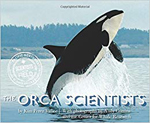 In the prologue, readers are introduced to marine biologist Mike Big, who began counting and photographing orcas in the early 1970s over concern that their capture for marine parks was decimating both resident and transient pods in the Pacific Northwest. In six chapters, readers learn about the current research of biologists from the Center for Whale Research focused on Southern Resident orcas in the waters off the San Juan Islands. Sidebars and captioned photographs of orcas and the researchers at work add interest. A “How to Get Involved and Stay Informed” section on efforts to save the endangered orcas is included in the extensive back matter.
In the prologue, readers are introduced to marine biologist Mike Big, who began counting and photographing orcas in the early 1970s over concern that their capture for marine parks was decimating both resident and transient pods in the Pacific Northwest. In six chapters, readers learn about the current research of biologists from the Center for Whale Research focused on Southern Resident orcas in the waters off the San Juan Islands. Sidebars and captioned photographs of orcas and the researchers at work add interest. A “How to Get Involved and Stay Informed” section on efforts to save the endangered orcas is included in the extensive back matter.
—CA
Ages 15+
Life Inside My Mind: 31 Authors Share Their Personal Struggles. Jessica Burkhart (Ed.). 2018. Simon Pulse/Simon & Schuster.
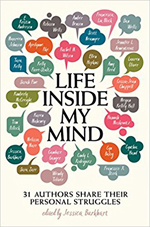 This anthology includes eye-opening and real-life essays by 31 authors about depression, addiction, OCD, anxiety and other mental health problems which have not been discussed frequently in the past. Robison Wells discusses the pills he takes each day, including pills to combat the side effects of other pills. Francesca Lia Block laments on not realizing her good friend suffered from manic depression until it was too late. Dan Wells informs readers that “building your life around a crippling mental illness . . . is a thing that never leaves you.” For teenagers who are experiencing any of these issues, this book could be a lifesaver, letting them know that someone else is going through what they are. For all readers, the collection heightens awareness and encourages thoughtful discussions of important mental health issues.
This anthology includes eye-opening and real-life essays by 31 authors about depression, addiction, OCD, anxiety and other mental health problems which have not been discussed frequently in the past. Robison Wells discusses the pills he takes each day, including pills to combat the side effects of other pills. Francesca Lia Block laments on not realizing her good friend suffered from manic depression until it was too late. Dan Wells informs readers that “building your life around a crippling mental illness . . . is a thing that never leaves you.” For teenagers who are experiencing any of these issues, this book could be a lifesaver, letting them know that someone else is going through what they are. For all readers, the collection heightens awareness and encourages thoughtful discussions of important mental health issues.
—SK
Susan Knell is a professor in the department of Teaching and Leadership at Pittsburg State University in Pittsburg, Kansas, where she teaches literacy and literature courses at the undergraduate and graduate level. Skye Hisiro is an elementary classroom teacher in Harrisburg, Pennsylvania, and is a recent graduate from Pennsylvania State Harrisburg’s Masters in Literacy Education Program.Carolyn Angus is former director of the George G. Stone Center for Children's Books, Claremont Graduate University, in Claremont, California.
These reviews are submitted by members of the International Literacy Association's Children's Literature and Reading Special Interest Group (CL/R SIG) and are published weekly on Literacy Daily.